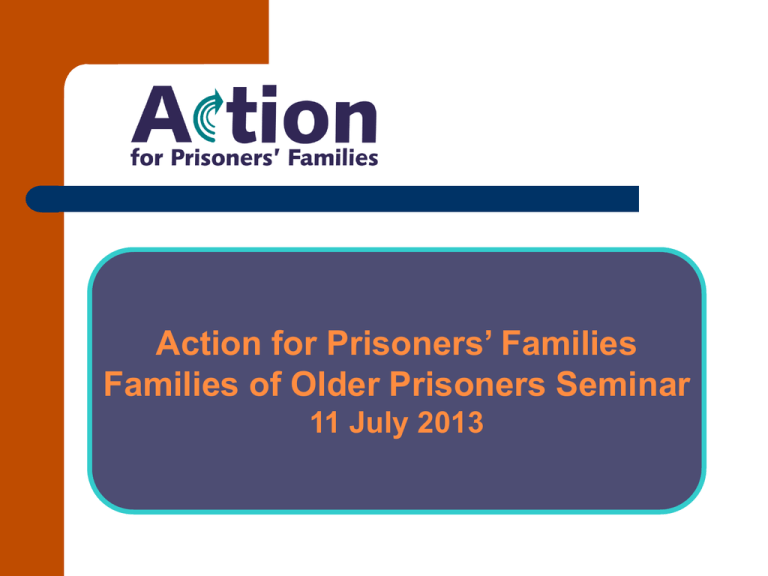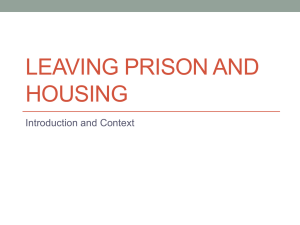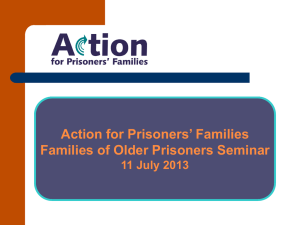
Action for Prisoners’ Families
Families of Older Prisoners Seminar
11 July 2013
Barriers to communication
Sandra Seldon and
Anna Haggith, Recoop
RECOOP
Resettlement and Rehabilitation and Care of Older Prisoners
• Key objectives are:
• To maintain a strong presence in prisons
delivering direct services especially in the South
West
• To deliver a service offering continuity and
realistic rehabilitation opportunities “through the
gate”
• To influence policy.
Why?
RECOOP was set up because
• People over 50 are the fastest growing section of the prison population
•
•
•
•
•
•
•
•
•
•
•
•
•
Older prisoners and ex-offenders face ill health, financial, social and housing
problems
Older offenders are more likely to face social isolation, and to have lost
contact with friends and family
RECOOP works with older offenders because
The numbers of older people entering the criminal justice system has
trebled in the past twenty years
It is estimated that approximately 10% of prisoners are aged over 50
Despite being the fastest growing section of the prison population, there is little
research, little data and information and little current provision available
There are no specific national policies addressing the particular needs of this
group
Individual institutions and organisations often lack the resources and specialist
knowledge to meet older people’s health and social care requirements
More than 80% of older prisoners have long standing illnesses or disabilities
Over 50% suffer from a mental disorder
30% have a diagnosis of depression
Disabilities associated with chronic disease and lifestyle are more common in
older prisoners than older people in the community
Funding for education in prisons is often limited to people of working age
How do we know how older
offenders feel about their
families
We asked them…
Contact with Families – older
prisoners
•
•
•
•
We discussed:
How satisfactory is the level of current
contact with their family
What are the main issues/barriers to
contact
Individuals experience of challenges faced
by older prisoners
Types of contact – face-to-face, letters
etc
We conducted a small scale
informal survey to look at:
• Statistics around these aspects of
contact
• Issues around family contact for
older prisoners
• Some potential solutions to improve
practice
Questions and responses ..
Questions posed to groups
of prisoners – page 1
•
How many believe more contact with your families is possible but
not available?
51%
•
How many have grandchildren and great-grandchildren?
50%
•
How many have ageing parents who are now unable to visit you?
17%
•
How many times have you had contact face-to-face with your
families over the past 12 months?
16% once a week
84% nil contact
Questions posed – page 2
• How frequently have you had contact by letter
over the past 12 months?
61%
• How many of you have experienced a dropping off
in contact from family since you first came to
prison?
33%
• Is distance to prison an issue?
44%
We found some common issues ..
Issues raised
•
•
•
•
•
•
•
•
•
•
•
Distance from home
Age of parents
Offender was carer of elderly parent before sent to prison
Grandchildren and great-grandchildren not classed as
immediate family
Elderly spouses
Poor health
Cost of transport
Cost of phone credit relative to pay (PRT looking at this)
Limits placed on cash in letters via Governors
Family life goes on, acceptance of family member gone
In some cases courts deny contact with family
Prison Reform Trust – 2008
Juliet Lyon, director of Prison Reform Trust, said:
Prisoners staying in touch with their families is known to reduce risk, both
of re-offending on release and of suicide and self-harm in prison, so it is in
everyone's interest to enable people to phone home. Prohibitive call charges may
make a profit for some but they do nothing to create a safer society.
•
•
Research suggests that prisoners are six times less likely to reoffend if they
have a supportive family network to return to when they come out, and that
almost half of people in prison lose contact with their families during their
sentence.
•
The recent pressure of overcrowding has also meant prisoners are moved around
more, usually increasing their distance from home and reducing the chance of
family visits.
•
The complaint follows serious criticism of the market by the Prisons and
Probation Ombudsman for England and Wales and by prison Independent
Monitoring Boards (IMBs). There have also been repeated parliamentary
questions tabled on the subject with all requests to see the contracts
refused. The NCC also requested to see the contracts under the Freedom of
Information Act but was refused on the grounds of commercial sensitivity.
Is practice standard in
relation to Family Days?
Family Days
• Average of 4 per year – one a quarter
• One prison has 6 per year
• Prisoners with children under the age of 18 are
prioritised – Adjudication and other factors are
taken into account
• Sex offenders treated differently – rarely have
access to family days because of risks to other
families as well as their own.
• Grandparent days being considered in one prison.
Some suggested solutions ..
Ideas to take forward?
• Video Link – already available for court access
• Skype- via Probation Officers/local libraries
• Grandparent days - additional to existing quota – class
grandchildren as immediate family
• Review Assisted Prison Visitor Scheme to speed up the
process – via a Visitor Co-ordinator
• Consider moving prisoners to prisons nearer to their
families for short periods and then returning back to
original prison
• Older prisoners should be provided with extended visits for
elderly visitors who cannot visit often and have disabilities.
(PRT/TSB)
Compassionate Leave?
So how ill must a prisoner be to have this kind of request
granted?
Family contact is especially important before death for the
whole family?
The power to grant early release in England and Wales is held
by the Secretary of State for Justice – very few are
successful – 23 from 2000-2009.
Prison Service Order 6000:
Two possible grounds for appeal are cited - a prisoner's medical condition
and "tragic family circumstances".
The document says: "Early release may be considered where a prisoner is
suffering from a terminal illness and death is likely to occur soon. There are
no set time limits, but three months may be considered to be an appropriate
period". BBC Magazine/website August 2009
Capacity Building Older
Prisoner solutions
• NOMS have funded this project to improve
services for older offenders Nationally using the
models trialled and proved by RECOOP in the SW
• Trying to implement forums/discussion groups in
every establishment with a high older offender
cohort – so their voices are heard
• Looking for 3rd Sector links to deliver, comparable
to community based activities, a service that will
allow a smooth resettlement transition
• We’ve had some success but are looking for new
links
And something to
consider.
• As the percentage of older offenders
grows so does their need
• As older sex offenders age so do their
family and children – when 18 their
children may no longer be at risk. Who
manages them making contact?
• Sometimes their inmates are the only
family they’ve got
Can you contribute to the
work we do?
Have you experience do that may assist us and
contribute to development of improvements
for older prisoners?
We would love to hear from you and consider
ways in which we might collaborate?
Please contact us via:
Sandra.Seldon@recoop.org.uk
Anna.Haggith@recoop.org.uk
Action for Prisoners’ Families
Families of Older Prisoners Seminar
11 July 2013












